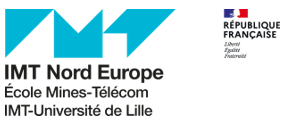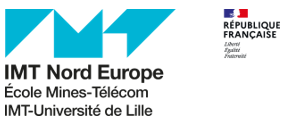Analyzing the Impact of Wireless Network Parameters on the Accuracy of Digital Twin Models Using Artificial Intelligence
| ABG-126906 | Thesis topic | |
| 2024-11-14 | Public funding alone (i.e. government, region, European, international organization research grant) |

- Computer science
- Engineering sciences
- Telecommunications
Topic description
The convergence of wireless networks and digital twin technology has transformed the ability to monitor,
analyze, and optimize complex physical systems in real time. Digital twins, which create virtual representations of physical systems, rely on accurate data transmission from wireless networks to function effectively. The accuracy of these digital twins is directly influenced by the quality and reliability of the data they receive, which depends on the performance of the wireless network connecting IoT devices to the digital twin environment.
In wireless networks, parameters such as network topology, signal interference, data rates, latency, mobility, energy consumption, and security protocols have a significant impact on data transmission. These parameters not only affect the speed and reliability of the network but also influence the precision of the data being relayed to digital twins. By investigating the relationship between these wireless network characteristics and the accuracy of digital twin models, this thesis aims to provide a comprehensive understanding of how network configurations affect the accuracy of virtual representations.
This thesis aims to investigate how various network parameters, including topology, interference, data rates, and mobility, impact the accuracy of digital twins. The study will explore the application of AI techniques, such as machine learning, predictive modeling, and optimization algorithms, to dynamically optimize network performance, predict network behavior, and improve the accuracy of digital twins.
Starting date
Funding category
Funding further details
Presentation of host institution and host laboratory
The Research Center for Automatic Control (CRAN) is a joint research unit between the University of Lorraine and the French National Scientific Research Center (CNRS) - Institute for Information Sciences and Technologies (INS2I).
Based on digital sciences, the laboratory is internationally recognized for its activities in the fields of signal and image processing, control and computer engineering, as well as for its work in health in connection with biology and neuroscience. Today, its fundamental and applied research enables it to accompany the changes in society and goes beyond the traditional industrial issues: energy production, management of the intelligent city or transport. In health, it is opening up to diagnosis and care in cancerology and neurology. They are crossing sociology, listening to social behaviors and opinion dynamics, and investing in the field of sustainable development, in the service of the circular economy and ecological systems.
Website :
Candidate's profile
- Master / Engineering degree in Computer Science or a related field
- Knowledge in Networks
- Skills in Simulation tools and development
Vous avez déjà un compte ?
Nouvel utilisateur ?
Get ABG’s monthly newsletters including news, job offers, grants & fellowships and a selection of relevant events…
Discover our members
 ANRT
ANRT  Institut Sup'biotech de Paris
Institut Sup'biotech de Paris  Laboratoire National de Métrologie et d'Essais - LNE
Laboratoire National de Métrologie et d'Essais - LNE  Généthon
Généthon  Institut de Radioprotection et de Sureté Nucléaire - IRSN - Siège
Institut de Radioprotection et de Sureté Nucléaire - IRSN - Siège  CASDEN
CASDEN  Groupe AFNOR - Association française de normalisation
Groupe AFNOR - Association française de normalisation  MabDesign
MabDesign  ADEME
ADEME  PhDOOC
PhDOOC  Nokia Bell Labs France
Nokia Bell Labs France  CESI
CESI  Aérocentre, Pôle d'excellence régional
Aérocentre, Pôle d'excellence régional  Tecknowmetrix
Tecknowmetrix  MabDesign
MabDesign  SUEZ
SUEZ  ONERA - The French Aerospace Lab
ONERA - The French Aerospace Lab  TotalEnergies
TotalEnergies  Ifremer
Ifremer
-
JobPermanentRef. ABG127643IMT Nord Europe- Les Hauts de France - France

Enseignante Chercheuse ou Enseignant Chercheur (Professeure ou Professeur) en Data/IA
Digital - Data science (storage, security, measurement, analysis) - TelecommunicationsConfirmed -
JobPermanentRef. ABG127640IMT Nord Europe- Les Hauts de France - France

CHARGEE/CHARGE DE RECHERCHE Génie et physique des matériaux polymères
Energy - Materials scienceConfirmed -
JobPermanentRef. ABG125662Association Bernard Gregory (ABG)Paris (3ème) - Ile-de-France - France

Responsable Recrutement, Relations Entreprises et Partenariats
Open to all scientific expertisesAny



